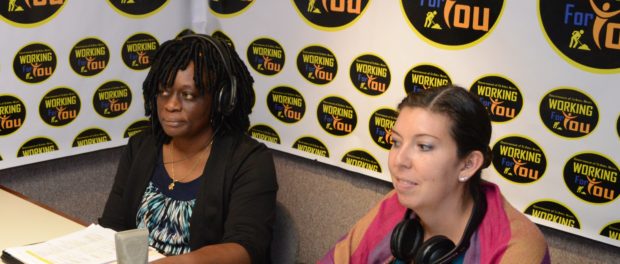CLIMATE CHANGE PRESENTS OPPORTUNITIES FOR SMALL ISLAND DEVELOPING STATES
Get our headlines on WHATSAPP: 1) Save +1 (869) 665-9125 to your contact list. 2) Send a WhatsApp message to that number so we can add you 3) Send your news, photos/videos to times.caribbean@gmail.com
 Representatives from the Ministry of Tourism, Assistant Secretary, Diannille Taylor-Williams, and Annette Esquibel, Sustainable Tourism Coordinator.
Representatives from the Ministry of Tourism, Assistant Secretary, Diannille Taylor-Williams, and Annette Esquibel, Sustainable Tourism Coordinator.
Basseterre, St. Kitts, August 25, 2017 (SKNIS): Although climate change has its disadvantages, it can also be used as an opportunity for Small Island Developing States (SIDS), especially St. Kitts and Nevis in a number of ways, said representatives from the Ministry of Tourism, Assistant Secretary, Diannille Taylor-Williams, and Annette Esquibel, Sustainable Tourism Coordinator.
The duo appeared on Wednesday’s (August 23) edition of “Working for You” to engage in discussions surrounding the Climate Smart Sustainable Tourism Forum to be held in St. Kitts from September 6-8, 2017, organized by the St. Kitts Ministry of Tourism, the St. Kitts Sustainable Destination Council, the Caribbean Tourism Organization (CTO) and Sustainable Travel International.
“It [climate change] is an opportunity to rethink the traditional tourism business model. Instead of only relying on resorts and sun, sea and sand, you have an opportunity to really diversify your tourism product and make more eco- tourists, more rain forest focused or even have philanthropy tourism,” said the sustainable tourism coordinator, adding that there are multiple examples worldwide but one of the best is coral regeneration. “If we could start a programme where tourists actually came in and helped us do the coral regeneration programme as part of their tourism experience, that will be really unique, really beneficial and it would put St. Kitts and Nevis on the map in a totally different realm than we are right now.”
Adding to the brilliant idea of coral regeneration, Mrs. Taylor- Williams shared similar sentiments, noting that it can indeed prove beneficial to the federation.
“With the coral regeneration, it also impacts livelihoods because when you have the coral reefs it means more fish, that means we get to eat fish, and lobsters would grow,” she said, adding that tourists request lobsters when they visit the shores. “We also have the Sargassum seaweed situation and that is another opportunity for enterprise in terms of creating a new business.”
Mrs. Taylor-Williams shed more light on the Sargassum of seaweed, noting that it can be used as fertilizer. She said that St. Kitts and Nevis has had regional studies done, and she also highlighted a local meeting that was held on the same topic.
“The students at the Clarence Fitzroy Bryant College (CFBC) did a controlled study with regards to the use of the Sargassum seaweed as fertilizer and it was found that they did make a difference,” she said. “They tried it in four different context – dried, wet and they also did it mashed, and pulverized. The one that was pulverized, the colour of the leaves were better, the fruits were bigger and the colouring of the fruits were better.”
She said that the students recognized that it was an opportunity for St. Kitts and Nevis to replicate and take it to the bigger farms as it is available in abundance. She added that it creates an ease on the fishermen because the Sargassum of seaweed is a nuisance to them.
The Climate Smart Sustainable Tourism Forum will be held under the theme “Good for Us, Better for All”.
Leave a comment
You must be logged in to post a comment.